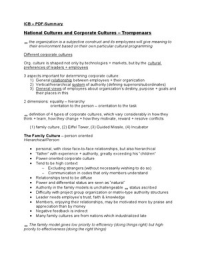ICB – PDF-Summary
National Cultures and Corporate Cultures – Trompenaars
the organization is a subjective construct and its employees will give meaning to
their environment based on their own particular cultural programming
Different corporate cultures
Org. culture is shaped not only by technologies + markets, but by the cultural
preferences of leaders + employees
3 aspects important for determining corporate culture:
1) General relationship between employees + their organization
2) Vertical/hierarchical system of authority (defining superiors/subordinates)
3) General views of employees about organization’s destiny, purpose + goals and
their places in this
2 dimensions: equality – hierarchy
orientation to the person – orientation to the task
definition of 4 types of corporate cultures, which vary considerably in how they
think + learn, how they change + how they motivate, reward + resolve conflicts
(1) family culture, (2) Eiffel Tower, (3) Guided Missile, (4) Incubator
The Family Culture – person oriented
Hierarchical/Person
personal, with close face-to-face relationships, but also hierarchical
“father” with experience + authority, greatly exceeding his “children”
Power-oriented corporate culture
Tend to be high context
Excluding strangers (without necessarily wishing to do so)
Communication in codes that only members understand
Relationships tend to be diffuse
Power and differential status are seen as “natural”
Authority in the family models is unchallengeable status ascribed
Difficulty with project group organization or matrix-type authority structures
Leader needs employee’s trust, faith & knowledge
Members, enjoying their relationships, may be motivated more by praise and
appreciation than by money
Negative feedback is indirect
Many family cultures are from nations which industrialized late
The family model gives low priority to efficiency (doing things right) but high
priority to effectiveness (doing the right things)
,The Eiffel Tower Culture – role oriented
Hierarchical/Task
Bureaucratic division of labor with various roles and functions prescribed in
advance
Consists of “normal” employees, supervisors, managers, etc. hierarchy
Each role at each level is described, rated for its difficulty complexity, and
responsibility, and has a salary attracted to it
Boss’s role is to instruct and you obey, purpose of corporation is conveyed
through him
Boss in the Eiffel Tower Culture is only incidentally a person – essentially he or
she is a role
Relationships are specific and status ascribed
Careers are much assisted by professional qualifications
Learning = accumulating the skills necessary to fit a role and hopefully the
additional skills to qualify for higher positions
Change = effected through changing rules
in theory, constant rule-change would be necessary, but it would in practice
bewilder employees, lower moral, and obscure the distinction between rules &
deviations
would be immensely complex + time-consuming
Employees are ideally precise and meticulous
Duty is an important concept
Conflicts = seen as irrational, pathologies of orderly procedure, offences
against efficiency
Criticism/Complaints dealt with through even ore rules and fact-finding
procedures
The Guided Missile Culture – project oriented
Egalitarian/Task
Egalitarian = belief that everyone is equal & should have equal rights
Oriented to tasks, typically undertaken by teams or project groups
Must do “whatever it takes” to complete a task, and what is needed is often
unclear and may have to be discovered
Frequently draw on professionals and are cross-disciplinary
Expensive, because professionals are expensive
Temporary groups
Ultimate criteria of human value = how you perform and to what extend you
contribute to the jointly desired outcome
Steering is corrective + conservative, ot as open to new ends as to new
means
Learning = “getting on” with people, breaking ice quickly
Change comes quickly, high turnover rate
Loyalties to professions and projects are greater than loyalties to the company
Motivations tend to be intrinsic – team members get enthusiastic, identify with
and struggle toward final product
, Culture tends to be individualistic
Management by objectives & people are paid by performance
The Incubator Culture – fulfilment oriented
Equalitarian/Person
Organizations are secondary to fulfilment of individuals, existence precedes
organizations
Purpose: to free individuals from routine to more creative activities and to
minimize time spend on self-maintenance
Almost no structure, the structure it does have is for personal convenience
Roles are crucial, are there to confirm, criticize, develop, find resources for
and help to complete the innovative product or service
Minimal hierarchy
Environment of intense emotional commitment
Commitment to world-changing, society-redeeming nature of work
Limited in size small innovative companies
All participants are on the same wavelength, empathically searching together
for a solution to shared problem
Motivation: is wholehearted, intrinsic + intense
Little concern for personal security and few wish to profit or have power apart
from the unfolding creative process
Leadership is achieved, not ascribed
Follow those whose progress most impresses you and whose ideas work
Conflict is resolved either b splitting up or by trying the proposed alternative to
see which works best





